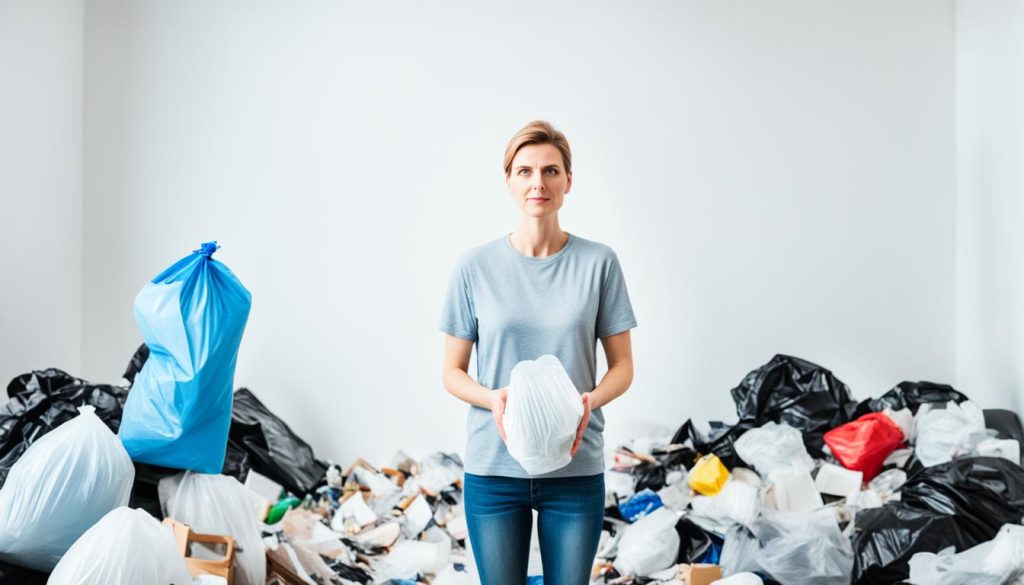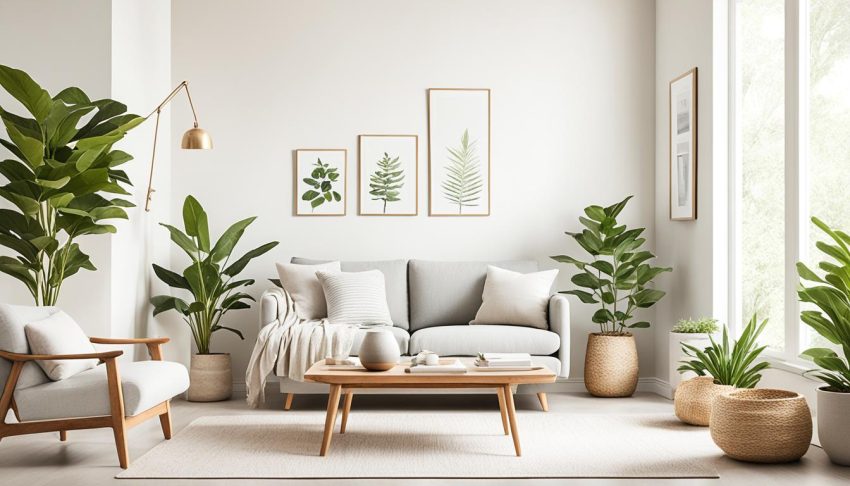Have you ever thought about living a simpler life? Minimalism might be the answer. It’s not just a trend; it’s a way to live that can change your life. It brings freedom, clarity, and a closer bond to what’s important.
Picture a life without all the clutter and distractions from too many things. What if you could spend your time on what makes you feel alive? Minimalism means living with only the basics. It can surprise you with its benefits.
Key Takeaways
- Minimalism can lead to a simplified, clutter-free life, allowing you to focus on what truly matters.
- Embracing minimalism can provide freedom from the passion to possess, leading to a more authentic and intentional lifestyle.
- Minimalism can contribute to improved mental clarity, financial freedom, and a reduced environmental impact.
- By living with less, you can create more space for personal growth, creativity, and meaningful connections with loved ones.
- Minimalism is a counter-cultural movement with deep historical roots, offering an alternative to the modern mania of consumerism.
The Pursuit of Happiness
Outward Success, Inward Emptiness
Many people think that having a lot of stuff means they’re happy. Joshua and Ryan, the founders of The Minimalists, were young professionals with big homes and high-paying jobs. But they felt empty inside, even with all their possessions. They wanted a life that was more meaningful and fulfilling.
They found happiness by embracing minimalism. It wasn’t about getting more stuff. It was about focusing on what’s important: growing, contributing, and living with purpose.
“True contentment is found in cultivating meaningful relationships, appreciating the possessions we already have, pursuing personal growth, and aligning our actions with core values.”
About 6% of adults in the U.S. have a problem with compulsive shopping. And 90% of the clothes in grandma’s closet still had tags on them. This shows how chasing success and stuff can leave us feeling empty inside.
A study at the University of California found that having more money can make people less generous and more alone. Another study at the University of Rochester showed that people who focused on wealth and fame weren’t happier than those who aimed for personal growth.
Getting plastic surgery doesn’t make people feel better about themselves. It doesn’t fix deep issues like low self-esteem or depression. A study of teenage girls found that those who got cosmetic surgery were more likely to feel anxious or depressed.
But helping others can make us feel fulfilled and happy. A study in Pittsburgh found that people who helped others had more activity in their brain’s reward centers. They had less stress, high blood pressure, and inflammation too.

Now, people are spending money on what really matters to them, not just on stuff. True happiness comes from building strong relationships, valuing what we have, growing personally, and living with purpose.
Embracing Minimalism
Minimalism is a way of life that focuses on clarity, purpose, and being intentional. It means choosing what we value most and letting go of distractions. This approach helps people stop chasing possessions and focus on living simply and authentically.
In recent years, minimalism has become more popular, thanks to social media like Instagram and TikTok. These platforms show how a minimalist life can bring clarity, focus, and freedom from clutter.
Living minimally can make life more meaningful and purposeful. About 73% of people who start minimalism find decluttering addictive and feel accomplished and free. But, 62% struggle to keep minimalism as a lifestyle.
Minimalism is all about living with intention and setting priorities. 41% of minimalists say it’s about living intentionally and setting priorities over how much stuff you have. This mindset helps people focus on what’s important, not just their stuff.
Minimalism also helps the planet. Adult Americans throw away over 68 pounds of clothes a year, and the average home has 300,000 items. By living minimally, people can help make the world more sustainable.
At its core, minimalism is about living without the need for constant buying and doing. It lets people focus on what really matters, leading to a more meaningful life.

| Statistic | Value |
|---|---|
| Adult Americans throw away more than 68 pounds of clothing every year | US National Library of Medicine |
| 20-21% of working Americans say they aren’t saving any money for retirement. Many of the ones who are saving put away no more than 10% of their income | Bankrate.com |
| The average American household has 300,000 items | Los Angeles Times |
| The average family in America spends $1,700 on clothes each year | Forbes |
These numbers show how much waste and overconsumption there is in America. Embracing minimalism can help simplify life and support a sustainable future.
“Minimalism is the intentional promotion of the things we most value and the removal of everything that distracts us from it.” – Joshua Becker, Founder of Becoming Minimalist
Planning for Change
Minimalism is more than just getting rid of stuff. It’s a big change that needs careful planning and new habits. Joshua and Ryan wanted to live simpler, so they started a 21-day minimalism challenge.
They picked 21 days because it’s how long it takes to form a new habit. Joshua and Ryan worked hard to become happy, free, and minimalist. They went through three weeks of decluttering, digitizing, and simplifying their lives.
The 21-Day Challenge
The challenge was all about planning for change, forming habits, and decluttering. Joshua and Ryan knew they needed determination, consistency, and a good plan. They broke it down into daily tasks to help Ryan simplify his life.

Ryan looked at his stuff, digital clutter, and daily routines closely. He focused on what really mattered. This 21-day journey helped him build lasting habits for a more fulfilling and intentional life.
Intentionality: The Core of Minimalism
Minimalism is all about being intentional. It means choosing what you value most and letting go of the rest. This means looking deep within to find your true values, passions, and goals. By focusing on what’s important, minimalism can improve many areas of life.
The minimalist movement started in the 2010s but has roots in a 1960s New York art scene. It’s about living with purpose and choosing what’s truly valuable. Minimalists believe that having fewer things doesn’t mean less happiness. It’s about making choices that match your personal goals and dreams.
Kristina Gonzalez Sander believes in living with intention. She says making purposeful choices and setting boundaries is key. Minimalists buy things that are sustainable, ethical, and useful. Jack Krier adds that having a positive outlook and clear goals can make life better, leading to more happiness and balance.
Minimalism isn’t about giving up things. It’s about making the most of what you have. It’s about focusing on what’s good for your well-being. This idea works in any living space, big or small, by making sure your stuff supports your goals.
Minimalism helps clear out distractions and makes your stuff more valuable. Getting rid of clutter can reduce stress and make your home feel peaceful. Managing your time well is also part of minimalism. It helps you save time by cutting down on clutter and unnecessary items.
The heart of minimalism is being intentional with your values, passions, and purpose. By focusing on what’s important, minimalists find freedom and joy in a life lived with purpose.

“Minimalism is intentional living that focuses on minimizing distractions to prioritize what’s important.”
Freedom from the Passion to Possess
Modern culture tells us that happiness comes from getting more stuff. But, the minimalist movement shows us a different way. It teaches us that true joy and abundance come from relationships, experiences, and being thankful for what we have.
The average American has about 300,000 items at home. The fashion industry adds 10% to global CO2 emissions, and most clothes end up in landfills. This shows how our culture of buying more and more leaves us feeling empty. Minimalists choose to live differently, focusing on what’s important.
“The reason we struggle with insecurity is because we compare our behind-the-scenes with everyone else’s highlight reel.” – Steve Furtick
Minimalism helps us stop chasing after new things. It lets us focus on being thankful, making strong relationships, and enjoying life’s experiences. This way, we live a more abundant life, without always wanting the latest stuff.
Minimalism isn’t about giving up everything. It’s about living with purpose and balance. Joshua Becker shows us, you can be a minimalist and still have a house and a car. It’s about choosing things that really matter to you and make you happy, not just buying because you want to.

By living minimally, we can escape the trap of consumerism and cultivate a more fulfilling, intentional, and abundant life. This journey helps us grow personally, financially, and connects us more with the world.
Why Minimalism
Minimalism is a way of life that makes things simpler and richer. It gives people a lot of freedom. This freedom comes from not wanting to own a lot, not being caught up in constant buying, and living a life that matches their true values.
Minimalism focuses on what’s really important. Instead of having lots of stuff, minimalists value simplicity and find happiness in the basics. This helps them spend their time and energy on things that truly fulfill them.
Minimalism brings a clear focus and clarity. By having fewer things and commitments, people can ignore distractions. They can focus on what’s really important to them. This leads to being more productive and creative, as they can fully dive into their hobbies and work without being held back by too much stuff.
| Benefits of Minimalism | Impact |
|---|---|
| Freedom from the passion to possess | Reduced stress, more time, and financial resources to focus on what truly matters |
| Freedom from modern mania | Improved mental well-being, increased productivity, and deeper engagement in meaningful activities |
| Freedom from duplicity | Authenticity, alignment of values and actions, and a sense of inner peace |
| Simplification of life | Reduced decision fatigue, increased creativity, and a more organized, peaceful environment |
| Environmental benefits | Reduced overconsumption and waste, contributing to a more sustainable future |
Minimalism is a movement that encourages people to slow down and focus on what’s important. By living this way, people can feel free, simple, and fulfilled. It leads to a life that’s more meaningful and intentional.

“Minimalism is the intentional promotion of the things we most value and the removal of everything that distracts us from it.” – Joshua Becker
In a world that values having a lot, minimalism offers a different path. It’s about living with clarity, focus, and purpose. By choosing what’s essential and letting go of the rest, people can escape the trap of materialism. They find true freedom and happiness by living a life that’s true to them.
Slowing Down the Modern Mania
In today’s fast world, we often feel rushed and stressed. The constant demands of life can make us feel overwhelmed. Minimalism offers a way to slow down and live more intentionally.
Minimalists focus on what’s really important by simplifying their lives. They cut down on stuff and commitments. This lets them focus on what’s truly important.
By doing this, they can be more mindful and find a better balance between work and life. They connect more with themselves and the world around them.
“Minimalism is the intentional promotion of the things we most value and the removal of everything that distrains us from it.” – Joshua Becker
Minimalism is about valuing less and living with intention. It helps people stop rushing and focus on what’s important. By letting go of the extra, they can spend their time and energy on what truly adds value to their lives.
Living minimally has many benefits. People often feel more focused, less stressed, and more grateful for what they have. This can lead to better health and a stronger connection with others and the world.

Minimalism isn’t about getting rid of everything. It’s about making choices that match your values. By stepping back from the constant need to buy and do more, people can focus on what’s truly important.
Minimalism offers a different way to live. It’s about slowing down and living with purpose. By following minimalism, people can escape the fast pace of life and find a more meaningful existence.
Living with Authenticity
In today’s world, many people find it hard to be themselves consistently. The minimalist lifestyle offers a fresh way to live. Minimalists stick to one life, not changing to fit in or follow trends.
Overcoming Duplicity
Being true to oneself is key in minimalism. Unlike those who play different roles, minimalists dare to be real at all times. They find true happiness and fulfillment by being open and consistent.
Studies show that being authentic leads to better well-being. People who are true to themselves feel happier and more confident. Dr. Mark Hyman, a health expert, says being true to oneself is as crucial as eating right and exercising.
Minimalists first figure out what’s important to them. Then, they live their lives in a way that shows who they really are. This lets them ignore what others think and focus on what’s important to them.
“Minimalism frees individuals from the passion to possess and the need to impress. It allows them to push past societal norms and focus on bettering themselves authentically.”
Living minimally means spending less time on stuff and more on growing personally. This change helps people live more consistently and honestly. Their actions match their true values and beliefs.

Minimalism makes people think more about their choices in all areas of life. By picking quality items and simplifying their lives, minimalists live in a way that truly shows who they are. They don’t let too much stuff weigh them down.
Counter-Cultural Movement
Minimalism is a big change from the culture pushed by companies and the media. This culture worships celebrities and chasing success, glamour, and fame. Minimalism, on the other hand, suggests a quieter way. It tells people to slow down, buy less, and enjoy what really matters.
This movement speaks to those who feel they’ve been chasing the wrong goals. Studies show that being busy is linked to how we see ourselves. The average American home has about 300,000 items, showing a lot of stuff and too much accumulation.
Living simply and minimalism are seen as unusual. Many think those who live this way are “weird.” People often link having things with being successful and happy. These counter-cultures have faced challenges like arrests, being made fun of, and losing friends and family.
But, the minimalist movement is getting bigger. It offers a different way to life, away from endless buying. Ads hit us with up to 5,000 messages a day, and the average American owes over $6,000 on credit cards. This shows the constant push to buy and use more.
“Minimalism fosters gratitude, reducing the chronic urge to replace or upgrade possessions. The focus shifts from striving for the idealized American Dream to savoring the present moments.”
Minimalism teaches people to live with purpose, thinking about what items really add value to their lives. This movement encourages slowing down, buying less, and enjoying what’s important. It goes against the usual ways of life.

The Internal Journey
Embracing minimalism is more than just cleaning up your space. It’s a journey inside, too. After getting rid of physical clutter, people focus on their heart issues, relationships, and life purpose. It’s about finding freedom and unity within.
Moving from a big suburban home to a smaller, designed apartment changes how you see things. This move shows a deeper look at who you are and what you value. When deciding what to keep, you think about how items affect your relationships and identity.
“Only 2% of the notebooks, books, and notes I have kept over the years remain useful,” the author admits, highlighting the high rate of non-essential material retention.
Decluttering can make your home feel bigger and more organized. This change shows the power of minimalism in making the most of your space. It reflects the inner changes people go through as they set new priorities and find their life purpose.
Clearing out a deceased parent’s home can push someone towards minimalism. It makes them face the stuff left behind and think about their own stuff. Health issues, like Courtney Carver’s multiple sclerosis, can also lead to a minimalist life, focusing on what’s important.
The internal journey of minimalism is about being free from the need to own everything. It’s about knowing what you really need and want. It leads to a life of quality, not quantity, and deeper relationships.

Embracing minimalism means picturing a life that matches your deepest needs and dreams. It’s about seeing how simplicity helps you on your internal journey, addressing heart issues, and finding your life purpose.
Achievable for All
Minimalism is not just for the rich. It’s a way of life that anyone can choose for a more meaningful existence. It shows that minimalism achievable for everyone, no matter who you are or where you come from.
Joshua Fields Millburn and Ryan Nicodemus, the creators of The Minimalists, prove this. They went from a family with lots of stuff to living simply. Their story shows that minimalism is unique to anyone ready to question the need for so much.
“Minimalism is not about what you own, it’s about why you own it.”
People of all ages, from young adults to seniors, are finding happiness with minimalism achievable. By choosing what they really need and want, they’re making their lives easier and more fulfilling. They enjoy less stress and more money, proving that minimalism is for everyone.
Everyone’s path to minimalism is different, but the core ideas are the same. It’s about knowing what’s important to you, focusing on that, and letting go of the rest. This approach helps people live in a way that truly reflects their true selves, making life simpler and more fulfilling.

Minimalism isn’t just about getting rid of things or looking a certain way. It’s a personal journey to find what truly makes you happy. Whether it’s downsizing, simplifying your day, or having deeper experiences, minimalism achievable is for anyone ready to start.
An Accidental Minimalist
Embracing simplicity can sometimes happen unexpectedly. For many, the journey towards minimalism starts not by choice but by life events. These events lead them to a simpler, more intentional way of living. This is the story of an “accidental minimalist” – someone who found the power of living with less through letting go.
At first, minimalism might have seemed scary to this person. They were influenced by the trend but felt defensive. Yet, after learning about simple living, they started to see things differently. They found freedom by realizing that too many possessions can trap us.
This accidental minimalist saw their desire to shop and collect things drop. They found joy in living with less. The idea “less is more” became a big revelation, changing their life.
Their journey shows how simplicity can change us. Letting go of the extra led to freedom from materialism. This freedom let them focus on what’s important – relationships, experiences, and purpose.
Stories like this inspire others to think differently about their stuff. They show the benefits of a accidental minimalist lifestyle. This approach helps reduce environmental impact and improves mental health.

This journey shows us that living with intention and purpose comes from letting go. It’s about the power of embracing simplicity and its big impact on our lives.
Saying Yes to Less
Minimalism is more than just not buying things. It’s a choice to be careful with your time, money, and energy. It means saying no to things that drain you and yes to what brings joy, purpose, and matches your values. This change helps you live more sustainably and feel more meaningful in life.
One person’s story shows how they started saying “no” to free items and cut down on social events. They even took a year off from shopping. This choice reduced their clutter and helped them focus on what’s really important, like being true to themselves and their family.
“Rarely do I experience decision fatigue these days. I’ve learned to say ‘no’ to poorly defined projects, activities that don’t align with my values, and even free stuff that would just add to the clutter. This has given me more time, energy, and focus to devote to what’s truly important.”
Saying “yes” to less has many benefits. It leads to a less busy and cluttered life, giving you the freedom to focus on what’s important. This way of living supports both your personal and environmental sustainability. It also brings a deeper sense of significance and contentment.

The strength of minimalism is in making intentional choices about your time, money, and energy. By choosing to say “yes” to less, you can live a life that reflects your values. This leads to a more fulfilling existence.
Simplicity in Business
Minimalism is all about living with intention and cutting out the extra stuff. It can also work in business, leading to big benefits. For example, a client found this out during the COVID-19 pandemic.
This client looked at her business closely and decided to focus on what was truly important. She stopped taking on too many clients and projects that drained her. Instead, she focused on her main goal and the work she loved. This change led to more time, less stress, and more profit.
This story shows how being simple in business can make you wealthier and happier. By focusing on the basics and getting rid of distractions, companies can work better and make their work environment better for everyone.
Just like people find happiness with minimalism, businesses can too. Getting rid of the extra stuff and focusing on what’s important can make businesses more profitable and satisfying.
Going simple in business means making tough choices, like saying goodbye to clients or projects that don’t fit your vision. But, the benefits can be huge, like more freedom, less stress, and more focus on what’s important.
By cutting back, sticking to your main goal, and managing your energy well, businesses can do better in the long run. This way of thinking in business shows how simplicity can lead to more success and purpose.

Conclusion
As we end our journey into minimalism, we see it’s not about giving up. It’s about gaining more joy, more living, more love, and more adventures. This path to happiness and freedom may not be the only way, but it’s a great start.
By looking at our lives and choosing what truly matters, we can focus on our purpose. Minimalism helps us simplify and find a new sense of purpose. It lets us reconnect with ourselves, our loved ones, and the world, leading to a more fulfilling life.
Decluttering our stuff, reducing our online presence, or living more intentionally are all ways to apply minimalism. These practices help us live with more simplicity, clarity, and happiness. Let’s keep moving forward, using minimalism to build a life full of happiness, freedom, and endless possibilities.

